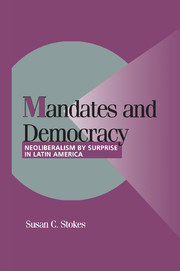Book contents
- Frontmatter
- Contents
- Preface
- 1 ELECTIONS, MANDATES, AND REPRESENTATION
- 2 ELECTIONS AND ECONOMIC POLICY IN LATIN AMERICA
- 3 EXPLAINING POLICY SWITCHES
- 4 ARE PARTIES WHAT'S WRONG WITH DEMOCRACY IN LATIN AMERICA?
- 5 NEOLIBERALISM WITHOUT MANDATES: CITIZENS RESPOND
- 6 MANDATES AND DEMOCRATIC THEORY
- 7 SUMMARY, PREDICTIONS, UNSETTLED QUESTIONS
- References
- Author Index
- Subject Index
- Titles in the series
6 - MANDATES AND DEMOCRATIC THEORY
Published online by Cambridge University Press: 10 December 2009
- Frontmatter
- Contents
- Preface
- 1 ELECTIONS, MANDATES, AND REPRESENTATION
- 2 ELECTIONS AND ECONOMIC POLICY IN LATIN AMERICA
- 3 EXPLAINING POLICY SWITCHES
- 4 ARE PARTIES WHAT'S WRONG WITH DEMOCRACY IN LATIN AMERICA?
- 5 NEOLIBERALISM WITHOUT MANDATES: CITIZENS RESPOND
- 6 MANDATES AND DEMOCRATIC THEORY
- 7 SUMMARY, PREDICTIONS, UNSETTLED QUESTIONS
- References
- Author Index
- Subject Index
- Titles in the series
Summary
The House of Commons has no more right to initiate legislation, especially immediately upon its first meeting, of which the constituencies were not informed, and of which the constituencies might have been informed, and as to which, if they had been so informed, there is … the very greatest doubt as to what their decision might be.
Marquess of Hartington, addressing the British Parliament (1886)Power was delegated to the president, and he did what he deemed best.
Guillermo O'Donnell (1994)Guillermo O'Donnell believed he had discovered in delegative democracies a new “species” of the genus democracy. But a long tradition of theorists of representative government would find much that is familiar in the Latin American scenarios he observed. The scenario – voters seem to elect a government to carry out some policies, governments don't seem to follow voters' wishes, and voters turn against them – is not at all foreign to representative governments that O'Donnell would be unlikely to call delegative democracies. In the first preceding epigraph, a British Member of Parliament railed against William Gladstone, a fellow Liberal, because of his government's immediate postelection change of course (on the question of Irish home rule.) The Marquess of Hartington's criticisms would be repeated, a century later, by critics of Latin American policy switchers.
Just how important mandates are to democracy has been a topic of perpetual disagreement. The abandonment of campaign promises, many claim, is not a perversion of representative democracy but part of its normal functioning.
- Type
- Chapter
- Information
- Mandates and DemocracyNeoliberalism by Surprise in Latin America, pp. 154 - 184Publisher: Cambridge University PressPrint publication year: 2001
- 1
- Cited by

